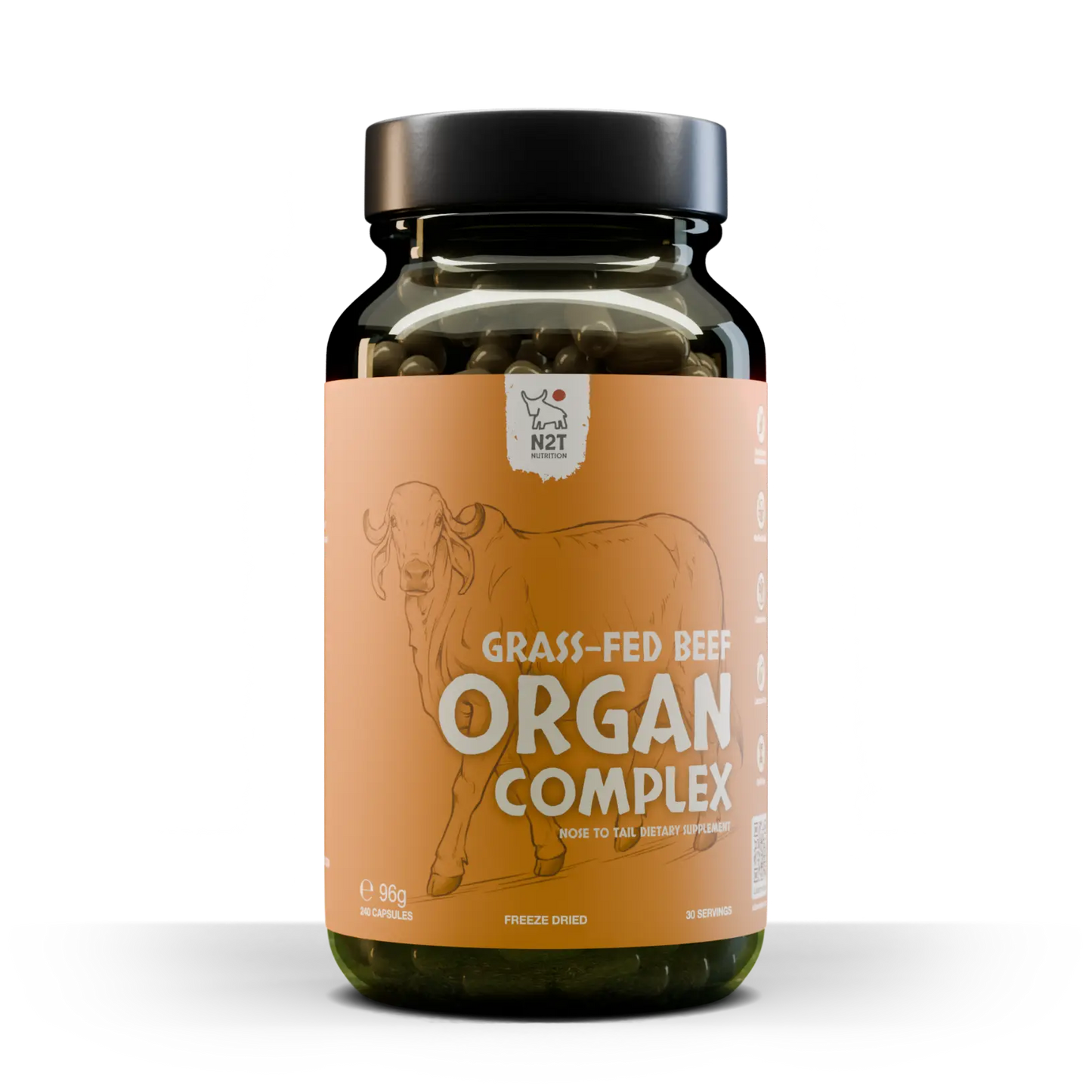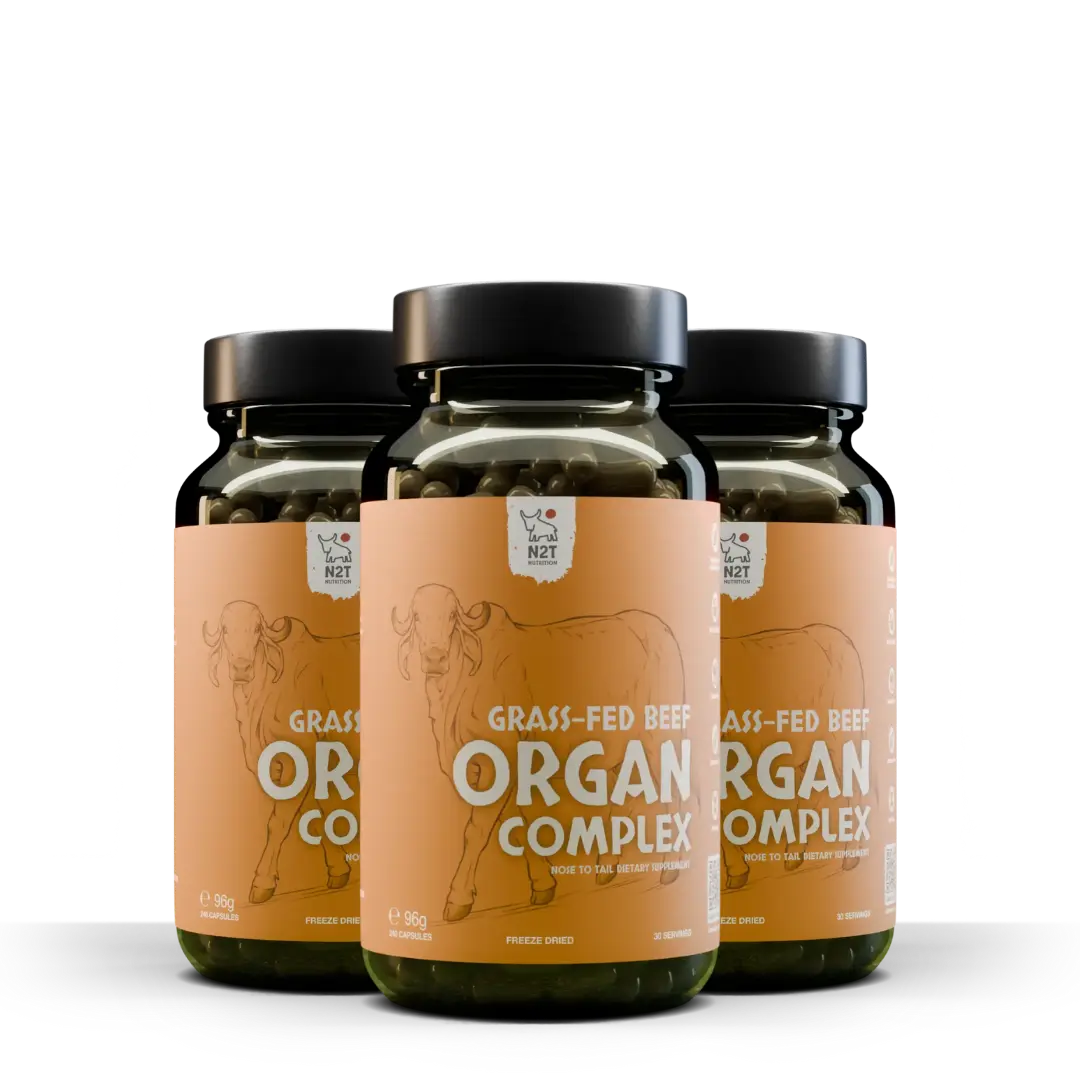





-
🌱 Certified Organic, Grass-Fed, Grass-Finished:
Our products are sourced from cattle that are exclusively grass-fed and grass-finished, meaning they graze on nutrient-rich pastures their entire lives. Grass-finished cattle are never fed grains, ensuring they receive optimal nutrition from start to finish. These organic pastures remain untouched by synthetic pesticides or fertilizers, providing the purest and most natural diet for our animals. This approach not only supports the well-being of the cattle but also enhances the nutritional quality of the organ meats, offering you a superior, sustainable, and holistic product.
Why does this matter? Grass-fed and grass-finished beef is not only more sustainable and humane, but it also results in meat and organs that are richer in essential nutrients. These products are higher in bioavailability, meaning the body can more easily absorb and utilize the nutrients. Grass-fed beef is notably higher in vitamins like A and E, as well as antioxidants and healthy fats like Omega-3s. It also ensures that no synthetic hormones or antibiotics are used, making it a cleaner and healthier choice. -
💊 Gelatin Capsule:
At N2T, we use bovine gelatin capsules for our supplements, prioritizing natural and high-quality ingredients in every aspect of our products. Bovine gelatin capsules are made from animal collagen, ensuring they are a natural, digestible, and highly compatible choice for supplement encapsulation. They provide excellent bioavailability, meaning your body can more effectively absorb the nutrients contained within the capsule.
Unlike HPMC (Hydroxypropyl Methylcellulose) capsules, which are synthetically created from plant fibers and often used to achieve an EU organic label, our bovine gelatin capsules align with our commitment to natural, holistic products. While using HPMC capsules could allow us to label our products as EU organic, we choose bovine gelatin to maintain our product integrity and ensure that every component of our supplements is as natural as possible. This choice reflects our dedication to sustainability, ancestral principles, and the overall well-being of our customers. -
🥩 Beef & it’s Bioavailability:
Beef organ meats offer unparalleled bioavailability, meaning the body can more easily absorb and utilize the nutrients, making it a superior source of essential nutrients for human health. Packed with highly absorbable vitamins, minerals, and complete proteins, beef aligns closely with human biochemistry. Its favorable fat profile and efficient digestibility ensure maximum nutrient uptake. Unlike plant-based sources, beef provides nutrients in forms that our bodies can readily utilize, supporting overall vitality and well-being. Choose our beef organ supplements for the most effective and natural way to nourish your body.
-
❄️ Freeze Dried:
Our supplements are freeze-dried to ensure they retain the highest level of nutrients possible. This gente method involves removing moisture from the ingredients at low temperatures, preserving natural vitamins, minerals, enzymes, and other vital compounds. Unlike canning and dehydrating, which use heat and can degrade these essential nutrients, freeze-drying maintains the integrity and bioavailability of the nutrients, providing you with the most effective and potent supplement possible. This process ensures that you receive the full benefit of the natural ingredients in their purest form.
Sources & Health Claims
Collapsible content
Sources / Studies
1. National Library of Medicine: Choline: An Essential Nutrient for Public Health: https://www.ncbi.nlm.nih.gov/pmc/articles/PMC2782876/
2. National Academy Press: DRI DIETARY REFERENCE INTAKE https://nap.nationalacademies.org/read/6015/chapter/1
3. National Institutes of Health: Iron https://ods.od.nih.gov/factsheets/Iron-HealthProfessional/
4. National Institutes of Health: Vitamin A and Carotenoids https://ods.od.nih.gov/factsheets/VitaminA-HealthProfessional/
5. USDA, Beef, variety meats and by-products, liver, cooked, braised: https://fdc.nal.usda.gov/fdc-app.html#/food-details/168626/nutrients
6. National Institutes of Health: Vitamin B12 https://ods.od.nih.gov/factsheets/VitaminB12-HealthProfessional/
7. Oregon State University: Copper: https://lpi.oregonstate.edu/mic/minerals/copper
8. National Library of Medicine: Effect of Different Cooking Methods on Folate Content in Chicken Liver: https://www.ncbi.nlm.nih.gov/pmc/articles/PMC7600162/
9. National Library of Medicine: The influence of selected ingredients of dietary supplements on skin condition: https://www.ncbi.nlm.nih.gov/pmc/articles/PMC4112259/
10. National Institutes of Health: Selenium: https://ods.od.nih.gov/factsheets/Selenium-Consumer/
11. National Library of Medicine: The Effects of Zinc and Selenium Co-Supplementation on Resting Metabolic Rate, Thyroid Function, Physical Fitness, and Functional Capacity in Overweight and Obese People under a Hypocaloric Diet: A Randomized, Double-Blind, and Placebo-Controlled Trial: https://pubmed.ncbi.nlm.nih.gov/37513551/
12. National Library of Medicine: History of zinc as related to brain function: https://pubmed.ncbi.nlm.nih.gov/10721938/
13. Healthline: What is Choline? https://www.healthline.com/nutrition/what-is-choline#what-it-is
14. National Library of Medicine: Comparative bioavailability of vitamins in human foods sourced from animals and plants https://pubmed.ncbi.nlm.nih.gov/37522617/#:~:text=The%20overview%20of%20studies%20showed,in%20foods%20sourced%20from%20plants.
15. National Library of Medicine:The relationship between nutrition and the immune system https://www.ncbi.nlm.nih.gov/pmc/articles/PMC9772031/
16.National Library of Medicine: Coenzyme Q10 in Cardiovascular and Metabolic Diseases: Current State of the Problem: https://www.ncbi.nlm.nih.gov/pmc/articles/PMC6131403/
17. WebMD: Pancreatic Enzyme Products - Uses, Side Effects, and More https://www.webmd.com/vitamins/ai/ingredientmono-254/pancreatic-enzyme-products
18. National Library of Medicine:The Role of Zinc in Male Fertility https://www.ncbi.nlm.nih.gov/pmc/articles/PMC7589359/
19. Healthline: Do Oysters Increase Your Sex Drive?: https://www.healthline.com/nutrition/do-oysters-make-you-horny#zinc
20. National Library of Medicine: Branched-chain amino acids and muscle protein synthesis in humans: myth or reality? https://www.ncbi.nlm.nih.gov/pmc/articles/PMC5568273/#:~:text=For%20synthesis%20of%20new%20muscle,three%20of%20the%20nine%20EAAs.
Official EU Health Claims
EU Register of nutrition and health claims made on foods
Zinc has a role in the process of cell division
Zinc contributes to normal DNA synthesis
Health relationship: DNA synthesis and cell division
Zinc contributes to normal acid-base metabolism
Zinc contributes to normal carbohydrate metabolism
Zinc contributes to normal cognitive function
Zinc contributes to normal fertility and reproduction
Zinc contributes to normal macronutrient metabolism
Zinc contributes to normal metabolism of vitamin A
Zinc contributes to normal metabolism of fatty acids
Health relationship: maintenance of normal serum testosterone concentrations
Zinc contributes to the maintenance of normal testosterone levels in the blood
Health relationship: fertility and reproduction
Zinc contributes to normal protein synthesis
Zinc contributes to the maintenance of normal bones
Zinc contributes to the maintenance of normal hair
Zinc contributes to the maintenance of normal nails
Zinc contributes to the maintenance of normal skin
Zinc contributes to the maintenance of normal vision
Zinc contributes to the normal function of the immune system
Selenium contributes to normal spermatogenesis
Selenium contributes to the maintenance of normal hair
Selenium contributes to the maintenance of normal nails
Selenium contributes to the normal function of the immune system
Selenium contributes to the normal thyroid function
Selenium contributes to the protection of cells from oxidative stress
Health relationship: protection of DNA, proteins and lipids from oxidative damage
Choline contributes to normal homocysteine metabolism
Choline contributes to the maintenance of normal liver function
Choline contributes to normal lipid metabolism
Vitamin A contributes to normal iron metabolism
Vitamin A contributes to the maintenance of normal mucous membranes
Vitamin A contributes to the maintenance of normal skin
Vitamin A contributes to the maintenance of normal vision
Vitamin A contributes to the normal function of the immune system
Vitamin A has a role in the process of cell specialisation
Vitamin B2:
Riboflavin contributes to normal energy-yielding metabolism
Riboflavin contributes to normal functioning of the nervous system
Riboflavin contributes to the maintenance of normal mucous membranes
Riboflavin contributes to the maintenance of normal red blood cells
Riboflavin contributes to the maintenance of normal skin
Riboflavin contributes to the maintenance of normal vision
Riboflavin contributes to the normal metabolism of iron
Riboflavin contributes to the protection of cells from oxidative stress
Riboflavin contributes to the reduction of tiredness and fatigue
Vitamin B12 contributes to normal energy-yielding metabolism
Vitamin B12 contributes to normal functioning of the nervous system
Vitamin B12 contributes to normal homocysteine metabolism
Vitamin B12 contributes to normal psychological function
Vitamin B12 contributes to normal red blood cell formation
Vitamin B12 contributes to the normal function of the immune system
Vitamin B12 contributes to the reduction of tiredness and fatigue
Vitamin B12 has a role in the process of cell division
Vitamin B6 contributes to normal homocysteine metabolism
Vitamin B6 contributes to normal protein and glycogen metabolism
Vitamin B6 contributes to normal psychological function
Vitamin B6 contributes to normal red blood cell formation
Vitamin B6 contributes to the normal function of the immune system
Vitamin B6 contributes to the reduction of tiredness and fatigue
Vitamin B6 contributes to the regulation of hormonal activity
Vitamin B6 contributes to normal cysteine synthesis
Vitamin B6 contributes to normal energy-yielding metabolism
Vitamin B6 contributes to normal functioning of the nervous system
Vitamin B1: Thiamin
Thiamine contributes to normal energy-yielding metabolism
Thiamine contributes to normal functioning of the nervous system
Thiamine contributes to normal psychological function
Thiamine contributes to the normal function of the heart
Vitamin B3: Niacin
Niacin contributes to normal psychological function
Niacin contributes to normal energy-yielding metabolism
Niacin contributes to normal functioning of the nervous system
Niacin contributes to the maintenance of normal mucous membranes
Niacin contributes to the maintenance of normal skin
Niacin contributes to the reduction of tiredness and fatigue
Pantothenic Acid: B5
Pantothenic acid contributes to normal energy-yielding metabolism
Pantothenic acid contributes to normal mental performance
Pantothenic acid contributes to normal synthesis and metabolism of steroid hormones, vitamin D and some neurotransmitters
Pantothenic acid contributes to the reduction of tiredness and fatigue
Folate contributes to maternal tissue growth during pregnancy
Folate contributes to normal amino acid synthesis
Folate contributes to normal blood formation
Folate contributes to normal homocysteine metabolism
Folate contributes to normal psychological function
Folate contributes to the normal function of the immune system
Folate contributes to the reduction of tiredness and fatigue
Folate has a role in the process of cell division
Supplemental folic acid intake increases maternal folate status. Low maternal folate status is a risk factor in the development of neural tube defects in the developing foetus.
Iron contributes to normal formation of red blood cells and haemoglobin
Iron contributes to normal oxygen transport in the body
Iron has a role in the process of cell division
Iron contributes to the normal function of the immune system
Iron contributes to the reduction of tiredness and fatigue
Meat or fish contributes to the improvement of iron absorption when eaten with other foods containing iron
Copper contributes to maintenance of normal connective tissues
Copper contributes to normal energy-yielding metabolism
Copper contributes to normal functioning of the nervous system
Copper contributes to normal hair pigmentation
Copper contributes to normal iron transport in the body
Copper contributes to normal skin pigmentation
Copper contributes to the normal function of the immune system
Copper contributes to the protection of cells from oxidative stress
Phosphorus is needed for the normal growth and development of bone in children
Phosphorus contributes to normal energy-yielding metabolism
Phosphorus contributes to normal function of cell membranes
Phosphorus contributes to the maintenance of normal bones
Phosphorus contributes to the maintenance of normal teeth
Manganese contributes to normal energy-yielding metabolism
Manganese contributes to the maintenance of normal bones
Manganese contributes to the normal formation of connective tissue
Manganese contributes to the protection of cells from oxidative stress
Magnesium contributes to a reduction of tiredness and fatigue
Magnesium contributes to electrolyte balance
Magnesium contributes to normal energy-yielding metabolism
Magnesium contributes to normal functioning of the nervous system
Health relationship: neurotransmission and muscle contraction including heart muscle
Magnesium contributes to normal muscle function
Magnesium contributes to normal protein synthesis
Magnesium contributes to normal psychological function
Magnesium contributes to the maintenance of normal bones
Magnesium contributes to the maintenance of normal teeth
Magnesium has a role in the process of cell division
Potassium contributes to normal functioning of the nervous system
Health relationship: Muscular and neurological function
Potassium contributes to normal muscle function
Potassium contributes to the maintenance of normal blood pressure
Omega 3 Fatty Acid:
α-linolenic acid (ALA) & linoleic acid (LA), essential fatty acids
Essential fatty acids are needed for normal growth and development of children.
Alpha-linolenic acid (ALA)
ALA contributes to the maintenance of normal blood cholesterol levels
Health relationship: maintenance of normal blood cholesterol concentrations
Source:
Europen Commission: EU Register of nutrition and health claims made on foods: https://ec.europa.eu/food/safety/labelling-and-nutrition/nutrition-and-health-claims/eu-register_en






